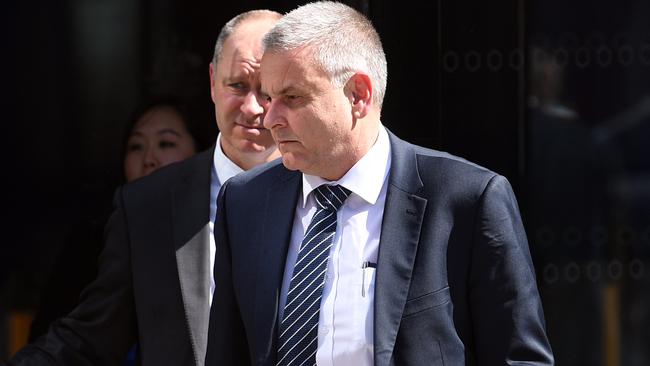He didn’t understand: The sickening phone call which shocked the royal commission
It’s the evidence which sickened royal commission watchers to the stomach: the abhorrent cold call pushing insurance on a man with Down’s syndrome | LISTEN
He did not have the ability to understand what was being pushed upon him, sold to him.
The intellectually disabled man provided his debit card detail, to the cold-caller, but didn’t know why.
He didn’t know his BSB number.
His answers seemed slow, and unsure.
The telephone insurance seller signed him up anyway.
A series of heartbreaking phone calls detailing how the man with Down’s syndrome was signed up for a life insurance policy — and his family’s resulting attempts to cancel it — have shocked many following the banking royal commission today.
One call played at the commission includes several long pauses as the man is asked questions such as whether he is an Australian resident, whether he has any family, and whether his mother is there at the moment.
“No, I have to go,” the man tells the salesman at one point.
“Two more minutes and I’ll let you go,” the salesman replies.
Witness Grant Stewart, a Baptist minister, relayed the story as he made a statement about his younger son, now aged 28, who bought insurance from Freedom Insurance in 2016.
His son has Down’s syndrome, and was still living at home two years ago when the cold call came and the nightmare began.
Mr Stewart’s son is “relatively high functioning” but “requires a good amount of assistance on general care issues, on making decisions, on living life”, Mr Stewart said.
He can read, write take public transport, has reasonable literacy and numeracy, but needs help with understanding what words mean and the relative value of numbers, Mr Stewart explained.
He has his own debit card and his parents are co-signatories, helping him understand what things are worth or if he had enough money to buy something.
“He finds complex instructions and unfamiliar settings difficult,” Mr Stewart said.
In June 2016 Mr Stewart discovered his son had been sold insurance when a letter arrived showing his son had taken out the Freedom Protection Plan, with an accidental death policy with a $50,000 benefit, an accidental injury policy with $50,000 benefit, and a final expenses cashback policy with $10,000 benefit.
Mr Stewart didn’t think his son needed insurance: the family has its own, and has provided for him in their wills.

“I was quite staggered because we had no idea that this had happened. I … was flummoxed really,” Mr Stewart told the commission.
“That’s taking advantage of someone”
His son remembered talking to someone on the phone, but felt “embarrassed” about the whole thing.
Mr Stewart rang Freedom to cancel the policy.
In the call, Mr Stewart said he was “very unhappy about this because I think that’s taking advantage of someone”. He said his son had an intellectual disability with very poor speech, so the sales agent should have realised.
But he wasn’t able to cancel the insurance immediately.
The Freedom representative said she would look into a recording and call back. She never did.
He emailed Freedom’s head of operations, Harvey Light, to lodge an official complaint.
“He does not possess the capacity to discern and indeed to make informed decisions about such things as his ‘need’ for life insurance … taking advantage of a person with an obvious intellectual disability for the purposes of luring them into buying one of your policies cannot be condoned,” he wrote.
He did not get a response to the email.
Two days later he and his son called Freedom again.
In that call, Mr Stewart again asked to cancel.
The sales agent responded with a pitch about how the cover was free for the first 12 months.
Mr Stewart said his son had no idea what he was taking out.
The agent replied: ”But I’m trying to explain to you, just in case you might want to keep that.”
Later, she said the company was happy to terminate the insurance.
That meant his son had to say the correct words.
Mr Stewart gently instructed his son to say “I wish to terminate the policy”.
His son stuttered through, requiring another two prompts to finish the sentence.
“He found it difficult to articulate the words, let alone understand what they meant,” Mr Stewart told the commission.
He told the commission his son was “quite distressed”, and didn’t understand what was happening throughout the call, because he thought he had done something wrong.
“Send recordings of the calls”
Mr Stewart contacted ASIC to complain, and cancelled his son’s debit card because he wasn’t convinced the payments would stop.
He asked Freedom to send recordings of the calls in which the sale had been made to his son.
The sales agent said the request should be emailed — which Mr Stewart had already done — and “it will probably be looked at within the next two to three working days”.
Mr Stewart did not receive the call recordings.
Two years later he still hadn’t.
He wrote to Freedom’s risk and compliance manager Lisa Delahunty asking for the call recordings. She replied saying she’d get back within the following week. She didn’t.
He sent a follow-up email and got a response saying she’d try to respond within a few days.
Mr Stewart got a letter from Freedom COO Craig Orton with the call recordings and internal communications.
Mr Orton wrote that the company investigated the sale and thought the policy ought to be cancelled, and the sales agent in question “was exited from the business” shortly after the sale.
He apologised for any distress caused, and said he was “disturbed and disappointed” to review the exchange, and it “does not reflect the culture and behavioural standards of Freedom Insurance” and that he had counselled the staff involved.
Two years on, Mr Stewart still feel “disturbed at the some of the communication that was involved” in the incident.
“I thought that it was a long time coming, an apology for what had happened, and I guess I was more disturbed at the potential for this kind of experience to happen to other people in similar circumstances to our son,” he said.
He thought some of the internal communications made light of his complaint and weren’t complimentary.
“Can I have both?”
The whole insurance sales call goes for 18 minutes. Mr Stewart has listened to the whole thing and was “quite disturbed”. He doesn’t think his son showed he understood what he was signing up for.
“He was being compliant and trying to be polite, but didn’t understand,” Mr Stewart said, adding it would have been apparent that the son was struggling with the questions.
He said his son didn’t understand the call or what he was committing to, and he didn’t think His son has become apprehensive about answering his phone despite his number being put on the Do Not Call Register, Mr Stewart told the commission.
Mr Stewart says his son knew he was giving evidence at the commission about “those calls he used to get”.
Orton’s response
Mr Orton told the Commission he had been appointed in February this year “to make improvements across the business”.
Changes included quality assurance for all sales calls, enhancements to vulnerable customer training, and practical guidance on customer training, he said.
Freedom had also stopped taking banking details on the first call.
As he continued to give evidence, he was given the opportunity to apologise.
Turning to face Mr Stewart he said “To you and your son I sincerely apologise for that — your son had to be put through that and you have that from the bottom of my heart. That should not have occurred.”




To join the conversation, please log in. Don't have an account? Register
Join the conversation, you are commenting as Logout